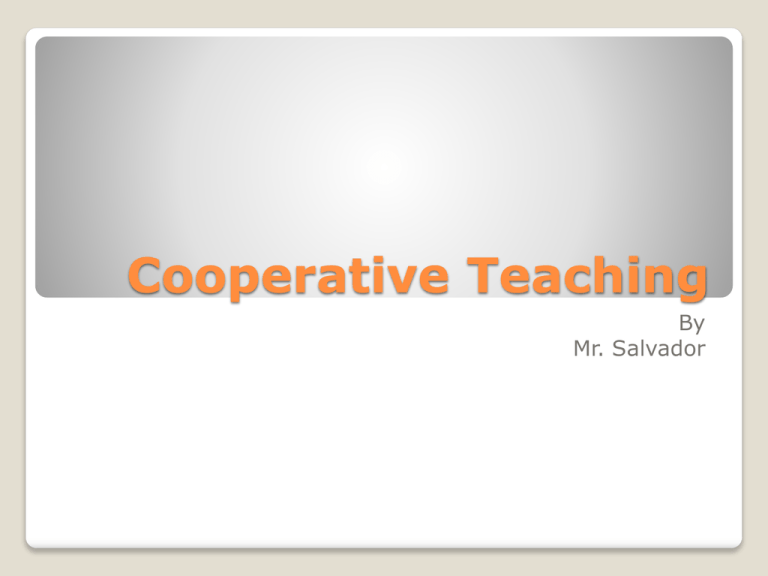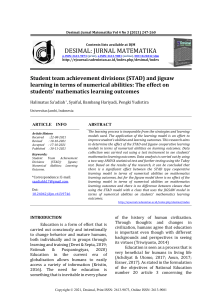Cooperative Learning... Steven
advertisement

Cooperative Teaching By Mr. Salvador Major Aspects to consider What approach will you use? Choosing your material? What are your objectives? How will you arrange seats? How will you divide groups? How will you set up transitions? How will you assess: individual and group? Lesson plan set up? Approach STAD- four or five member heterogeneous teams, worksheets or other study devices, tutoring, quizzing, team discussions. Jigsaw- five or six member “” teams, portion of materials, together learn topic, individual quizzes. Approach Group Instruction- Topic selection, Cooperative planning, Implementation, Analysis and synthesis, presentation of final product, Evaluation. Think-Pair-Share- Thinking, Pairing, Sharing. Numbered Heads Together- Numbering, Questioning, Heads Together, Answering. Choosing Material Have students had some previous contact with content matter? Is the content likely to entrust the students for which the lesson is for? If you use text does it provide sufficient info. on the topic? For Jigsaw, can content be easily broken up in to subtopics? For Jigsaw and STAD, can content be easily be but into objective quizzes that can be scored quickly. For GI, do you know the subject well enough to guide your students to subtopics and relevant resources and are there relevant resources available? Objectives Identify what goals you want your students to achieve. There needs to be group goals and individual goals addressed. Objectives need to be appropriate for task structures. Seating Cluster Seating- Clusters of four or six, students may need to move chairs for presentation. Swing Seating Arrangement- Desks arranged in L formations, Students at end desks swing around during group projects. Groups Opposite genders need to be put into all groups. Students of different ethnicities and races need to be grouped together. Students of differing achievement levels need to be grouped together. You must know your classroom. Numbering in certain situations can be dangerous. Transitions Write Key steps on whiteboard or on charts. State directions clearly and ask two or three students to paraphrase the directions. Identify and clearly mark a location for each learning team. Assessment For STAD and Jigsaw- There needs to be objective individual quizzes, base scoring method is used. Other forms final projects are given to grade: one for the group effort and one for individual effort. Lesson Plan Instructional Objectives- Example: Groups will create a presentation of… Materials- Example: individual computers, work packet, pen, and paper. Assignment of groups- Who /and/ or how the are assigned. Lesson Plan Task steps and procedures- What approach and in detail. Monitoring and Processing- Steps you will take to make sure all your students are participating. Assessment- How will you assess student work?

